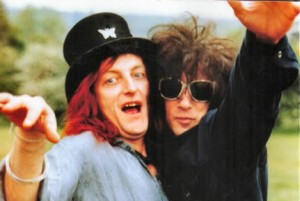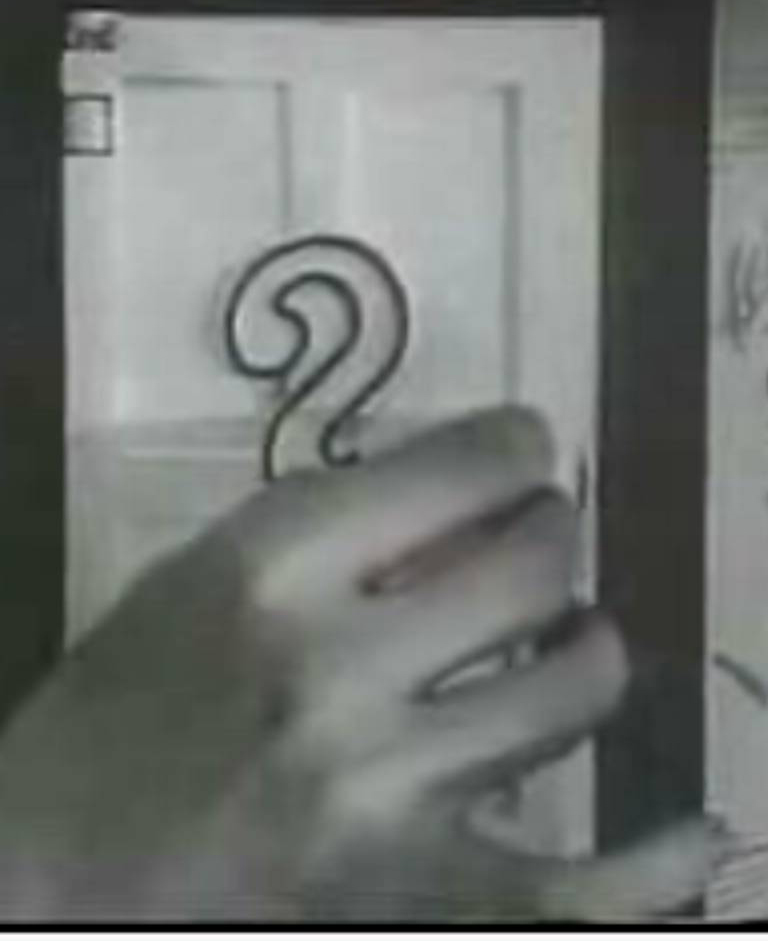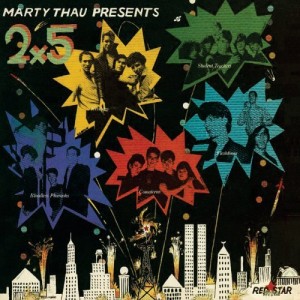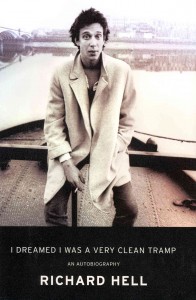I’m seeing reports that New York punk impresario Marty Thau has died at 75. Official reports are far and few between, however, in this electronic age, in which almost anyone who’s ever striven to be anyone merits a flurry of “he/she was a great (wo)man…” tributes. I cannot sincerely attest to the greatness of Marty Thau, but he seemed like an interesting person around whom cool artists gathered. He seemed at least as interesting as that spoken-word 1-hit wonder poet Maggie Estes, who sadly passed away at the age of 50 and who had a fling with MTV in the early ’90s, so let’s give it up for Marty Thau.
Late last night I finished reading the Richard Hell autobiography, I Dreamed I Was a Very Clean Tramp, which the machinery family gifted me for my 50th birthday. I loved it. Thank you, machinerys!
Considering I once suggested that Hell was a member of the multi-untalented ranks, led by showbiz’s supreme multi-untalent, Ben Vereen, I was leery about cracking open this gift. I did, however, cut my teenage punk rock teeth on “Blank Generation,” never failing to edge up in my seat in anticipation of the song’s short, twisted guitar solos that endeared me to the Voidoids’ unlikely bald, bearded, professorial guitarist Robert Quine. The entire Blank Generation album, in fact, was special and energetic, if a bit clumsy compared to Television’s Marquee Moon, led by Hell’s original partner-in-crime, Tom Verlaine.
Ah, hell, I’m a control freak! I’ve always been Verlaine guy deep down. I figured I’d learn some stuff about him, Quine, Friend of the Hall Richard Lloyd, and other mythical figures from my teenage years, a group of punks just a generation or so older than me who were laying down their legacy 90 miles up the turnpike.
The first thing I noticed, as I read Hell’s tales of his childhood is that the guy could write. It’s rare to find an artist autobiography that not only has a voice, not only has the voice of the artist, but has something more, something not always evident in the artist’s work. I knew Hell had intellectual pursuits and was a poet and writer and all that jazz, but based on the Hell I grew up “knowing” through his music and original persona, I had no idea he could be so thoughtful and succinct. What did I know? This book was heading up to be an exercise in exposing my own ignorance and prejudices. When it comes to this form of exercise, I’m Charles Atlas.
Rather than try to pose as a book reviewer and come off even more idiotic than usual, I’ll simply list my 10 reasons for loving Richard Hell’s I Dreamed I Was a Very Clean Tramp. I highly recommend you picking up this book—well, most of you.
SPOILER ALERT: My 10 reasons will give away some key autobiographical details that are rolled out in the course of the book. Stop reading now if you don’t want to know in advance that Hell, for instance—oh, never mind!


Martin and John (not pictured: Abraham).
Apologies
Dear Fellow Rock’n’Rollers, I have been remiss. Many months ago now I promised to write 3 articles on 3 “very British Johns” and I did not come through on parts 2 and 3, but I do have my excuses.
- Band trouble, we can all understand this affliction I hope
- I have been trying to organise my life to make studying for my degree at least possible!
- Drunk. Yep! Good’ol fashioned drunk
But no more excuses, on with Part 2! Better late than never.
Three Very British Johns, Part 2: John Cooper Clarke, The Bard of Salford
A lot of what people think about John Cooper Clarke is projected on to him. He has always been referred to as a “Punk Poet,” which doesn’t do him justice despite being true. He did arrive on the scene in the ’70s along with punk and he does dress very punk and the machine-gun delivery of his prose in the early days went down well with the punk audiences and he did form part of the punk vanguard, most definitely, but there is a lot more to his work than that. For me JCC is one of the greatest poets Britain has produced; laced with wit and social comment his poems range from the plight of the young to the many plus sides of a hire car.
He was born in Lancashire in 1949 and was inspired by a teacher who introduced him to poetry; his first job was a laboratory technician (he even did a sugar puffs advert in the ’80s). He began performing in folk clubs around Manchester and went on to perform on the same bill with all of the great punk acts of the ’70s. He recorded a few albums, even had a top 40 chart hit “Gimmix (Play Loud),” but after a varying level of success he disappeared off the scene for nearly 20 years. Some put this down to a chronic heroin addiction, which thankfully he kicked, but JCC puts it down to idleness and lack of ambition: “…lots of people take heroin and still keep a career,” as he explained in a TV interview in 2009.
The first time I ever heard JCC was when I caught a an episode of the Old Grey Whistle Test from 1978, with him performing a poem set to music called “I Don’t Wanna Be Nice.” I was convinced that this guy was everything that people had said about him: venomous, bile spitting drug-addled punk poet, but when you look at the body of his work and his demeanor in interviews he is actually a very “nice man” who is so much more than the moniker of Punk-Poet suggests and who only swears when it seems appropriate. Looks can be deceiving.



Will Your Mystery Date Be a Dream or a Dud?
I’m glad people liked our latest Mystery Date, “I Gotta Know,” an early single by Cleveland underground band Human Switchboard. When I downloaded recently a 21-track collection of their first album, which I regretted having sold years ago to support something of an ephemeral nature, and other releases from their late-1970 through early-1980s career I was pleased by how much I still enjoye their music. Who’s Landing in My Hangar was one of those albums a young me wore as a badge of honor. It felt really cool to not only own and dig that album but a mid-’80s solo album by primary singer-songwriter Bob Pfeifer, the guy who’s voice reminded you of Lou Reed, David Johanssen, Richard Hell, and the like. Long ago I also sold that pretty decent and really obscure album to fund the same ephemeral experience. Sad.
Anyhow, Human Switchboard was a pretty cool little band, if you ask me, that has failed to generate the hipster critical acclaim I would think they have coming to them. Check out these two opening songs from their lone studio album, “(Say No To) Saturday’s Girl,” sung by groovy organ player Myrna Marcarian, and the title track. Right off the bat the band did a great job of sequencing their range of ’60s pop and more biting garage-punk, occupying a place smack in the middle of early Blondie and artsier NYC bands like Television.
[audio:https://www.rocktownhall.com/blogs/wp-content/uploads/2011/11/Human-Switchboard_01_Say-No-To-Saturdays-Girl.mp3|titles=Human Switchboard, “(Say No To) Saturday’s Girl”] [audio:https://www.rocktownhall.com/blogs/wp-content/uploads/2011/11/Human-Switchboard_02_Whos-Landing-In-My-Hanger.mp3|titles=Human Switchboard, “Who’s Landing In My Hanger”]A couple of fun facts, some of which I learned in my few minutes of research in preparation for today’s reveal:
- Prior to the band’s “I Gotta Know” single they self-released an EP that was mixed by our unfortunate Mystery Date “dud,” Pere Ubu’s David Thomas! (I’ve also been digging those 4 songs, which I never knew existed until the other day.)
- The somewhat legendary Hoboken scenester Dave Schramm (eg, original lead guitarist for Yo La Tengo) was an original band member.
- Drummer Ron Metz would later join Schramm in his band, The Schramms.
- Pfeifer would move from leading underground music projects to becoming a major-label A&R man. He’s also made his bones as a novelist. Smart guy!



Will Your Mystery Date Be a Dream or a Dud?
Sure, this week’s Mystery Date was an easy one: that was Stiff Little Fingers, doing the folk song “Love of the Common People,” from their 1982 initial farewell album, Here Now… Many of you guessed this if you stuck around long enough for singer Jake Burns to fall into his typical “Joe Strummer on steroids” delivery. I am only disappointed that Townsman mwall didn’t chime in on this date. For a guy with strong, spartan tastes in music, he’s always surprised me by his top-to-bottom love for the band’s debut, Inflammable Material, an album I’ve always wanted to like more than I ever can beyond the amazing “Suspect Device” and “Alternative Ulster.” I was curious to hear his take on this recording—and maybe even acknowledge that I’d long ago seen beyond the facade of this band and peered into the mediocrity of their proto-Green Day track. “Brother,” I hoped he’d say, “I’ve got to give it to you for calling bullshit on these guys for all those years.”
I remember Townsman andyr or chickenfrank owning this album way back when and me thinking it was a “pretty good change of pace” for the band, the same way I thought The Ramones‘ poppy Pleasant Dreams was a welcome and long-overdue offspeed pitch to their limited repertoire. Over the years I rarely listened to their copy of that album again, but I continued to tell myself they had something extra in their tiny creative satchel. The other day I revisited this album, and boy was it lame. It sounded like they started listening to all the subpar Jam albums from the end of their run and trying to ape Weller’s moves rather than The Clash‘s.
There was no way they could have kept up with aping Clash records after Give ‘Em Enough Rope, so poor-man’s Jam was probably a reasonable career option. However, all the things that always bugged me about most of their first two albums—the blatant political pose, the complete lack of originality and/or humor, and especially the sense that “Shoot, given a manager and a producer my high school band could have made a record as mediocre as Nobody’s Heroes!”—remained. In retrospect, it’s no Pleasant Dreams.
I have another song from this album that I’d like to share with you, but it’s on my work computer at the moment. I’m too tired (and a little bummed, thanks to my Phillies losing tonight) to fire up that computer, and I’m off to a work trip to NYC all day tomorrow followed by an evening up there with Bryan Ferry, so the horn-driven, late-period “soulful” Jam-style number will have to wait. Meanwhile, enjoy the following live performance of another track from that album.
NPR’s All Songs Considered posted this image on FB, a mural in Asbury Park, going up near Asbury Lanes. They asked posters to identify the faces in the photo, a task which every Townsperson could probably tackle while threading a needle and riding a unicycle, blindfolded. But what I found interesting was one poster’s comment that it was the “Mt. Rushmore of Punk.” If that is to be true, the first thing to do is eliminate two faces.
To me, it seems like there are three people here who are givens and three whose presence is arguably dubious. Which four faces go up on your Mt. Rushmore of Punk?




